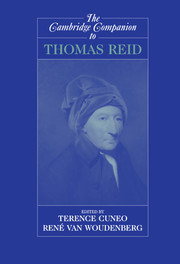Book contents
- Frontmatter
- Introduction
- 1 Reid in Context
- 2 Thomas Reid and the Culture of Science
- 3 Reid on Common Sense
- 4 Reid’s Theory of Perception
- 5 Reid’s Reply to the Skeptic
- 6 Nativism and the Nature of Thought in Reid’s Account of Our Knowledge of the External World
- 7 Reid and the Social Operations of Mind
- 8 Reid on Memory and the Identity of Persons
- 9 Thomas Reid’s Theory of Freedom and Responsibility
- 10 Reid’s Moral Philosophy
- 11 Reid’s Philosophy of Art
- 12 Reid’s Philosophy of Religion
- 13 Reid’s Influence in Britain, Germany, France, and America
- Bibliography
- Index
3 - Reid on Common Sense
Published online by Cambridge University Press: 28 May 2006
- Frontmatter
- Introduction
- 1 Reid in Context
- 2 Thomas Reid and the Culture of Science
- 3 Reid on Common Sense
- 4 Reid’s Theory of Perception
- 5 Reid’s Reply to the Skeptic
- 6 Nativism and the Nature of Thought in Reid’s Account of Our Knowledge of the External World
- 7 Reid and the Social Operations of Mind
- 8 Reid on Memory and the Identity of Persons
- 9 Thomas Reid’s Theory of Freedom and Responsibility
- 10 Reid’s Moral Philosophy
- 11 Reid’s Philosophy of Art
- 12 Reid’s Philosophy of Religion
- 13 Reid’s Influence in Britain, Germany, France, and America
- Bibliography
- Index
Summary
Reid held that every sane human being who has emerged from infancy and is not severely impaired mentally shares in common with all other such human beings certain “principles of common sense,” as he called them. These principles, so he argued, lie at the foundation of our thought and practice.I
The claim proves interesting and challenging in its own right. However, it seems unlikely that Reid would ever have developed his doctrine of common sense had he not believed that these principles play an important and indispensable role in the practice of philosophy. The doctrine of common sense has its home, in Reid's thought, in his understanding of the limits of philosophical thought and in his radical picture of the task of the philosopher which emerges from that understanding.
The philosopher has no option but to join with the rest of humanity in conducting his thinking within the confines of common sense. He cannot lift himself above the herd. Philosophy “has no other root but the principles of common sense; it grows out of them, and draws its nourishment from them; severed from this root, its honours wither, its sap is dried up, it dies and rots” (IHM I.iv: 19). Philosophers now and then profess to reject the “principles which irresistibly govern the belief and conduct of all mankind in the common concerns of life” (IHM I.v: 21).
- Type
- Chapter
- Information
- The Cambridge Companion to Thomas Reid , pp. 77 - 100Publisher: Cambridge University PressPrint publication year: 2004
- 10
- Cited by



